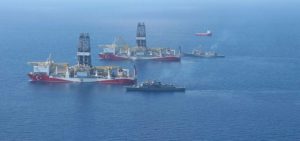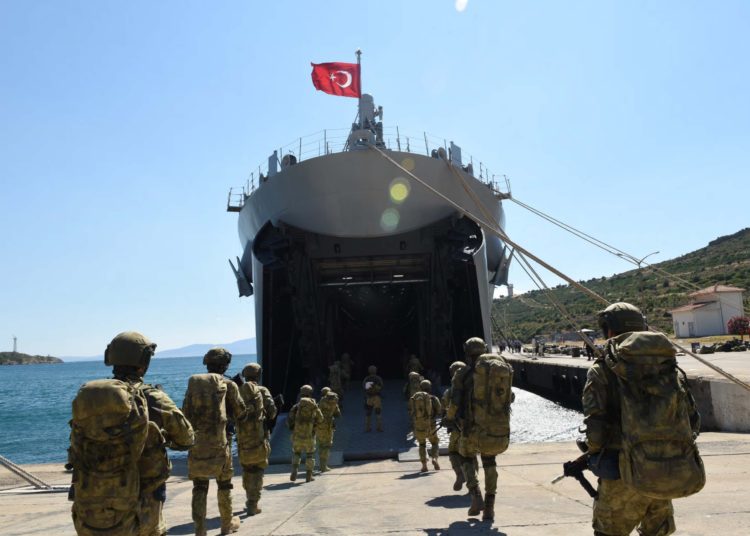Abdullah Bozkurt/Stockholm
Turkey named its secret military war plans for the eastern Mediterranean after a key Ottoman naval battle victory against a Christian alliance fleet that solidified Turks’ domination of the Mediterranean.
According to a PowerPoint presentation prepared by the General Staff for an internal planning review, Turkey drew up a plan for a secret military operation named “TSK CERBE Harekât Planlama Direktifi” (TSK [Turkish Armed Forces] Cerbe Operation Planning Directive). The plan was dated January 7, 2014, which means it was likely updated amid increased tension between Turkey and the Greece/Cyprus bloc in the eastern Mediterranean.
Cerbe, Djerba in English, is the name of a southern Tunisian island near the border with Libya. It was where the Battle of Djerba was fought in May 1560 between Ottoman forces and Christian Alliance fleet, composed chiefly of Spanish, Papal, Genoese, Maltese and Neapolitan forces. Turks won the battle, which gave them domination of the Mediterranean Sea.
The name of Turkey’s comprehensive war game plan in the east Med is befitting of the of narrative promoted by Turkish President Recep Tayyip Erdoğan and his associates, who have often framed Turkey’s problems with its Western allies as part of a renewed conflict between Christian Europe and Muslim Turkey.
A PowerPoint slide from the secret document lists Turkey’s military offensive plans against Greece and Armenia and in the eastern Mediterranean with corresponding dates indicating when they were drawn up:
In a parliament speech on June 9, 2021, Erdoğan branded NATO allies as anti-Muslim and accused Europe of sowing hatred and grudges against Turks. He said he would raise the issues at a NATO leaders summit in Brussels on June 13.
“Turkey will not refrain from raising its voice against anti-Islamic and anti-Turkish attacks in every platform and around the world,” Erdoğan said, adding, “We are following together the bitter consequences of the seeds of hatred and grudges sown around the world by those [Western powers and their allies] who resorted to every guise and tool to drag Turkey into political and social chaos.”
He underlined that Turkey would never take a step back, in apparent reference to his government’s position on the eastern Mediterranean, an issue that will certainly be brought to the agenda during the NATO leaders summit.
In June 2018 Erdogan claimed Turkey’s neighborhood faces “a post-modern Christian Crusade” while his mentor, then-Parliament Speaker İsmail Kahraman, said the same month that there was a Christian Crusaders’ wall before Turkey and vowed Turkey would overcome this barrier. All sorts of domestic problems were blamed on the West by Turkish leaders. When the Turkish lira plunged due to mismanagement and economic problems, Erdoğan’s chief economic advisor, Yiğit Bulut, came out and said in May 2018 that the decline in the value of the Turkish lira was part of a Christian crusade against Turkey.
Turkish president’s speech in parliament on June 9, 2021:
The existence of Turkey’s war game plan for the east Med was discovered in a court case file in the Turkish capital, with investigating prosecutor Serdar Coşkun, a loyalist of the Turkish president, apparently forgetting to remove the classified documents before submitting them to the court. They were collected from General Staff headquarters during an investigation into a failed coup on July 15, 2016. The documents including the invasion plan for Greece and Armenia were found to have been exchanged among top commanders at the General Staff by means of a secure internal email communications system. Coşkun ordered the military to forward copies of all email messages for the previous two months including the encrypted ones, on August 1, 2016.
Ten days later, on August 11, 2016, the prosecutor assigned his trusted helper, a police officer named Yüksel Var, to collect emails from the General Staff’s internal servers and report back to him. A commission set up by military technicians under Var completed its work on February 14, 2017. In the end, the indictment filed by prosecutors Necip Cem İşçimen, Kemal Aksakal and İstiklal Akkaya in March 2017 with the Ankara 17th High Criminal Court included all the emails collected from the General Staff computers. No communication was found in the emails indicating any hint of the coup attempt, which many believe was a false flag operation orchestrated by Erdoğan and his intelligence and military chiefs to set up the opposition for persecution and a mass purge.
The Turkish prosecutor ordered that all copies of the emails be sent to his office:
The document does not have any details on the specifics of the plan other than the name and the updated date of the plan. The details of the war plan must have been marked “top secret” and as such could not be shared through the intranet system run on the email exchange servers of the Turkish military. According to a TSK directive on information security that was explained in document No. MY114-4 (B), such sensitive plans can only be transmitted through a special communications systems called the Message Document Distribution System (Mesaj Evrak Dağıtım Sistemi, or MEDAS), or Automated Messaging Forwarding System (Otomatik Mesaj Aktarma Sistemi, or OMASIS).
The PowerPoint document appears to have been prepared for presentation at headquarters as a contingency plan with regard to developments in Syria. The Turkish military was assessing its capabilities and troop commitments according to various planning directives in effect with respect to its neighboring countries. They wanted to maintain their offensive and deterrence capabilities on the western and southern fronts while moving some troops and equipment to the Syrian border.
Lt. Gen. Uğur Tarçın’s warning about the secret General Staff documents came months later:
A review of the documents also indicates that the General Staff, which shared the emails at the outset, panicked eight months later over the possible fallout from the revelation of the sensitive documents and started sounding the alarm. The first warning letter was written on March 8, 2017 by Lt. Gen. Uğur Tarçın, head of the General Staff Communication, Electronic and Information Systems (Muhabere, Elektronik ve Bilgi Sistemleri, or MEBS). He warned the legal department of the General Staff that the documents contained secret documents about the national security of Turkey, classified intelligence reports and operations in Syria and the eastern Mediterranean. He said the documents must be kept secret and not shared with any unauthorized persons.
Acting on the advice of the MEBS commander, the General Staff’s deputy legal counsel, Col. Aydın Seviş, wrote to the Ankara 17th High Criminal Court on August 24, 2017, repeating the same concerns about the secret documents and urged the establishment of a commission to screen the documents. However, Turkish prosecutors appeared to have paid no attention to their concerns and included all the emails with their attachments of secret documents in the case file, exposing the highly classified information including the name of the invasion plan for Greece.
Col. Aydın Seviş sent a letter to the court expressing concern about the secret military documents when they were already incorporated into the case file:
Nordic Monitor previously reported names of the war plans with respect to Greece and Armenia.
The Erdoğan government has been ratcheting up its belligerent rhetoric against Greece and Cyprus since 2013, when it was rattled by major corruption investigations that incriminated Erdoğan, his family members and business and political associates. The Turkish president, backed by his nationalist and neo-nationalist allies, has been using Greece and Cyprus as punching bags to create a distraction from troubles on the domestic front. His government recently converted Hagia Sophia into a mosque, sparking a huge reaction from Greece.
Turkey-Libya maritime and security deals signed with Libya’s National Accord Government (GNA) in November 2019 have also shaken up politics in the Mediterranean, with some European and other regional states launching diplomatic and military counter-offensives. The maritime agreement determines the Turkey-Libya continental shelf and exclusive economic zone (EEZ), while the security deal allows the Turkish government to deploy troops in Libya and transfer paramilitary SADAT units and jihadists from Idlib to the Mediterranean country. Turkey sent exploration ships to the eastern Mediterranean, escorted by navy frigates, F-16s and drones, raising the stakes in the region. The Turkish government also took new steps on the divided island of Cyprus, where Turkey maintains a large contingent of troops in its north, by opening up some sections that were previously closed and moved away from a federal solution to resolve the decades-old Cyprus problem.













